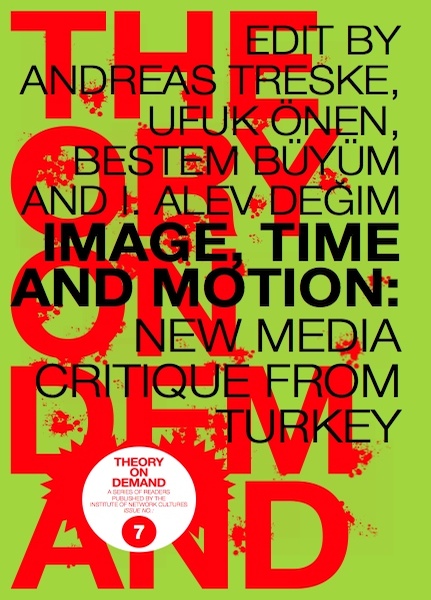Image, Time and Motion: New Media Critique from Turkey
 Edited by Andreas Treske, Ufuk Önen, Bestem Büyüm and I. Alev Degim
Edited by Andreas Treske, Ufuk Önen, Bestem Büyüm and I. Alev Degim
Published by Institute of Network Cultures, Amsterdam, 2011.
ISBN 978-90-816021-5-0
To order a copy or to download free PDF version click here.
This reader is a collection of essays written by Turkish graduate students between 2003 and 2010 for Andreas Treske’s seminar/course “Image, Time and Motion” at Bilkent University in Ankara, Turkey, revised and actualized in 2010. Coming from a wide range of disciplines they had studied before, very rarely media or cultural studies, these students brought in their various viewpoints and methods, and tried to integrate their observations and understandings in a seminar related to cinema and new media to discuss and sometimes just to describe the influences of digital media technologies for themselves and their colleagues. Starting from the premise that digital technology redefines our moving image culture, the authors reflect in their essays various kind of approaches and methods, experiences and practices, descriptive, critical and interdisciplinary.
Contributors: Pelin Aytemiz, Bestem Büyüm, I. Alev Degim, Bilge Demirtas, Fulya Ertem, Deniz Hasirci, Cagri Baris Kasap, Zeynep Kocer, Rifat Süha Kocoglu, Leyla Önal, Ufuk Önen, Didem Özkul, Segah Sak, Ayda Sevin, Umut Sumnu, Andreas Treske and Funda Senova Tunali.
Game Audio Curriculum Guideline (v1.0)
Prepared by the Game Education Working Group of the Interactive Audio Special Interest Group.
Published by MIDI Manufacturers Association Inc., Los Angeles, 2011.

‘Games Audio’ encompasses a diverse set of skills and concepts: from recording a tank, to hardcore DSP programming; from writing a tune for a mobile phone, to writing out string parts for a recording session with the London Symphony Orchestra… so defining a “game audio curriculum” is no simple task. Universities and Colleges around the world are interested in developing courses in this area, so the aim of the EDU Working Group is to provide guidance for course developers, which students may also use to understand what courses may be available to them.
Primary Authors (in alphabetical order): Karen Collins (University of Waterloo), Ken Felton (SCEA), Brad Fuller (Sonaural Studios), Templar Hankinson (Firelight Technologies), Stephen Harwood (NYU Steinhardt), Kurt Heiden (ION Audio), Steve Horowitz (The Code International), David Javelosa (Santa Monica College), Robbie Kazandjian (Soundboy Ltd), Jim Rippie (Invisible Industries), Michael Sweet (Berklee College of Music), Richard Stevens (Leeds Metropolitan University), Mike Worth (Westchester University of Pennsylvania, Drexel University), Ufuk Önen (Bilkent University).









Comments by Ufuk Onen